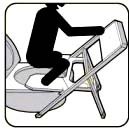|
Prostate CancerProstate cancer is a malignant tumor which starts in the prostate gland. Prostate cancer develops very slowly; it may be several years before any symptoms appear. Western researchers do not know the exact cause of this cancer in men. They have observed some patterns and identified several risk factors such as age, race, family history, etc. However, the majority are totally unaware of the connection between the prostate cancer and sitting toilets. As explained in the Prostate Problems section, on a sitting toilet, one has to execute the Valsalva Maneuver, ie: holding the breath and straining and pushing downwards with the diaphragm to evacuate waste. The repetitive stress on the pelvic floor, over time, weakens it and causes it to descend (pelvic floor prolapse). When this occurs, the pudendal nerve that controls bladder and prostate functions could be damaged due to stretch injury (pudendal nerve entrapment). When this occurs, the pudendal nerve can no longer carry nerve signals properly between the prostate and the brain. Invariably, the prostate gland - 'cut off' in this manner – becomes dysfunctional. Aside from enlargement (benign prostatic hyperplasia - BPH), pain and inflammation (prostatitis), the prostate gland can turn cancerous when its cells mutate and become malignant. The epidemic of prostate disorders is growing at a frightening rate... In the United States, prostate cancer is now the second leading cause of cancer-related deaths among men (after lung cancer). Each year, more than 200,000 new cases of prostate cancer cases are diagnosed. The cost of treatment is close to $5 billion a year (according to eMedicine.com). Yet, there is hope. There is a simple reason why prostate cancer is rare among men in China, India and Japan. It is toileting technique. Instead of sitting to evacuate waste, the majority of Asians still squat - as intended by Nature. |
The Best Toilet Converter in The World Today!


Helping People All Over
The World Achieve
Good Health Through
Correct Toileting Posture
Watch video on the
origin and story of
the Sandun-Evaco
toilet converter
All about Life,
Hope and Truth...
FREE:
One of the most
astounding books
you will ever read
in your life!








